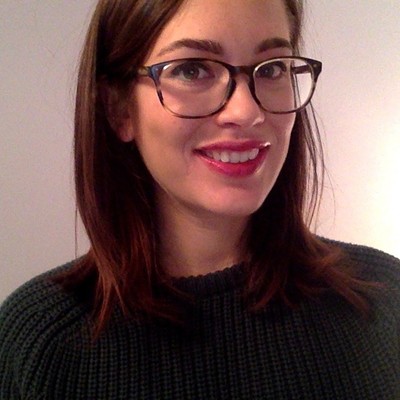The city of Phoenix plans to apply for $100,000 in grant funding in order to create a bike-share program in one of the city's poorest neighborhoods.
The money would be used to install two Grid Bike stations in the Edison-Eastlake community, which is home to three large public housing projects and cut off by the Interstate 10 freeway on both its north and east sides.
Nearly three-quarters of Edison-Eastlake residents live in poverty, and the neighborhood has a 31 percent unemployment rate, compared to just 4 percent citywide. In a study that the city conducted earlier this year, residents cited the lack of jobs in the area as the number-one obstacle they face when it comes to trying to find work.
So bringing more transportation options to the area makes sense.
Officials say the program will make it easier for low-income residents to get to jobs, schools, social services, grocery stores, and the light rail, which runs through the neighborhood, but doesn't stop there. The closest station is roughly a 25-minute walk from the A.L. Krohn Homes.
The city's housing department is applying for the grant in conjunction with an ongoing effort to revitalize the neighborhood. If the Aetna Foundation — a not-for-profit, charitable arm of the insurance giant — approves the city's grant application, the funding will also be used to distribute free helmets and hold bike-safety workshops.
The grant would also allow the city to give Edison-Eastlake residents a discount on Grid Bike memberships, which typically cost $15-$20 a month. Exactly how many of those discounted memberships will be available is something that will be worked out during the grant application process, deputy housing director Angela Duncan said, but the annual fee would be something in the range of $5.
Currently, signing up for Grid Bike means providing a debit card or credit card. Duncan says that they'll be looking at models in other cities to figure out an alternative for residents who don't have access to traditional banking methods.
"We want to make sure there wouldn't be a barrier to using Grid Bike if they didn't have a credit card," she explains.
Though undoubtedly well-intentioned, the decision to apply for the Aetna Foundation grant does raise the question: Since the city clearly sees the value of putting bike-share stations in low-income neighborhoods that are underserved by public transportation, why haven't they been doing that all along?
After all, less than a month ago, the City Council rubber-stamped the Street Transportation Department's request to expand the Grid Bike program and add 20 new stations, at a total cost of $825,000. Surely, at least one of those stations could have gone to Edison-Eastlake.
Instead, those new stations are destined for other, more affluent parts of the city — primarily downtown and around the Central Avenue corridor.
According to information that the Street Transportation Department provided to the City Council before the April vote, those locations were chosen based on crowdsourced suggestions, as well their proximity to popular destinations like the farmers' market, the warehouse district, and the State Capitol.
They also looked at usage data to figure out where the bikes are getting the most use. (The answer, resoundingly, was downtown.)
All of which totally makes sense if the goal is to get people to leave their cars at home and bike instead. It doesn't do much to create a more equitable transit system for the people who can't afford cars in the first place, though.
A quick look at Grid Bike's system map shows that the bikes are few and far between in South Phoenix, and nonexistent in Maryvale. Yet spend any time in either of those neighborhoods, and you'll quickly notice that there are a lot of people who rely on bikes to get around.
This neighborhood-to-neighborhood disparity should raise concerns, since the Grid Bike program is subsidized with public money, despite being run by a for-profit company. The $825,000 for the planned expansion, for instance, comes primarily from a federal grant intended to improve air quality. The city chipped in $47,025, as required by the terms of the grant.
That's not unusual — bike-share programs in other cities throughout the country have struggled to break even, especially in the first few years of operation.
Many wouldn't have gotten off the ground or been able to expand without some kind of publicly funded investment. (Santa Monica-based CycleHop LLC, which manages Phoenix's Grid Bike program, didn't immediately respond to a request for comment on whether the program is self-sustaining.)
But using public money to fund the program means that the city has an obligation to make sure that it's not just people in affluent neighborhoods who are benefiting from it. Bringing two bike stations to Edison-Eastlake and offering discounted memberships to residents there would be a good first step, but there's still a long way to go.
[
{
"name": "Air - MediumRectangle - Inline Content - Mobile Display Size",
"component": "18478561",
"insertPoint": "2",
"requiredCountToDisplay": "2"
},{
"name": "Editor Picks",
"component": "16759093",
"insertPoint": "4",
"requiredCountToDisplay": "1"
},{
"name": "Inline Links",
"component": "17980324",
"insertPoint": "8th",
"startingPoint": 8,
"requiredCountToDisplay": "7",
"maxInsertions": 25
},{
"name": "Air - MediumRectangle - Combo - Inline Content",
"component": "16759092",
"insertPoint": "8th",
"startingPoint": 8,
"requiredCountToDisplay": "7",
"maxInsertions": 25
},{
"name": "Inline Links",
"component": "17980324",
"insertPoint": "8th",
"startingPoint": 12,
"requiredCountToDisplay": "11",
"maxInsertions": 24
},{
"name": "Air - Leaderboard Tower - Combo - Inline Content",
"component": "16759094",
"insertPoint": "8th",
"startingPoint": 12,
"requiredCountToDisplay": "11",
"maxInsertions": 24
}
]












